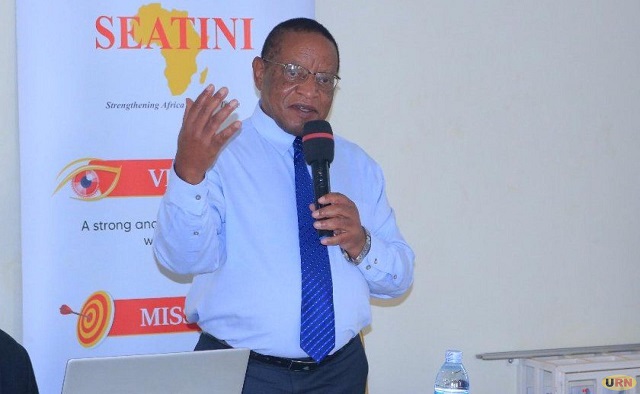
Prof. Suruma wants oil revenue used for social protection, similar to Gadaffi style
Kampala, Uganda | THE INDEPENDENT | Senior Presidential Advisor Prof. Ezra Suruma has advised the government to review the Parish Development model which, he describes as a good but mishandled project.
The former Minister of Finance, Planning and Economic Development and Makerere University Chancellor says he was the brainchild of the PDM 18 years ago but it was shelved until recently
Now, he says, it is being rushed and that there is a risk it will not achieve the objectives it was meant to achieve.
He was delivering a keynote speech and presentation about the role of social protection in ensuring sustainable development in Uganda, organized by SEATINI Uganda.
The dialogue aimed to harness youth voices on the investment policies, laws and agreements for decent work, green jobs and sustainable development in Uganda.
Asked what he would do differently, Suruma said that all the seven pillars of the program cannot effectively be implemented at ago, saying that for example, it would make more sense to focus fist on agriculture and increased productivity and marketing which are part of Pillar 1.
On financial inclusion, Prof Suruma suggests that the money should have been handled through banks and other financial institutions that have grassroots objectives.
“The 100 million shillings per year would have been enough to start a parish level bank and lent put at low interest rates, which would be more sustainable,” he said, adding that instead, all the pillars are being rushed through implementation.
He said the government should focus on returning cooperative societies at parish level and give people credit in form of agro commodity exchange, instead of dishing out cash to them, without even giving them financial literacy.
He says the government has missed on many programs which would provide social security if well handled, saying that PDM is a good project but should be handled with care.
The government is providing about 1 trillion shillings per year to implement PDM, however, experts say that this pillar is not reflecting financial inclusion, but a Microfinance program.
Another opportunity cited is the oil and gas industry, which Suruma says would be useful if part of the revenues were used to provide social security.
Suruma, who hailed the government of Libya under late Muammar Gadaffi on how they handled the revenues, says a significant part of the funds should go towards social security and the other left to government for infrastructure.
“His was the best example of how oil revenue can support social protection. I hear every Libyan was entitled to a house or at least an apartment,” he said, adding that Lybia showed that oil in Africa can be a blessing and not a curse, especially if policies in place support the welfare of young people who are the majority.
“Social security encompasses the security of all and includes child protection, unemployment insurance, health insurance, occupational accident insurance, old-age and veterans’ insurance,” Suruma says, adding Social Protection aims to ensure that everyone in the country has access to safety nets and support systems to improve their well-being, especially during times of need.
As said, social protection in Uganda is accessible to those in formal employment, yet more than 66 percent of Ugandans work on oral agreements, many without contracts.
Robinah Kagoye, Executive Director Labour Voices, said the government is a major contributor to the absence of social security for most Ugandans, by flaunting “cheap labour” as an advantage.
Uganda hasn’t revised its minimum wage since 1984—still at 6,000 shillings per month, while the amendment to make it 130,000 shillings was shelved when the president refused to assent to it.
Kagoye says this is a great disservice to Ugandans.
“Where are the decent jobs promised in exchange for cheap labour? It’s time for real change, not political slogans,” she said adding, “Labour is not a commodity. Cheap labor isn’t something to boast about—it undermines human dignity.”
She instead advocated for investments that promote social protection and fair wages, saying that it was time to prioritize labor rights and standards “in all our investment policies.”
It’s important that the communities hosting investments benefit from them. This means not just through job creation but also through improved infrastructure, access to technology, and a share in the economic gains.
The discussion about shifting towards green jobs is essential in the context of sustainable development.
Investment policies are not just about attracting capital but also about ensuring that these investments lead to decent work opportunities. This linkage is crucial because investments without the foundation of decent work could undermine long-term economic stability and growth.
Jane Nalunga, Executive Director, SEATINI Uganda said investment laws and agreements must align with Uganda’s broader goals of sustainable development.
This means integrating environmental protection, social equity, and economic growth into policy frameworks to ensure that development is both inclusive and sustainable.
“Investment policies should prioritize the creation of decent work opportunities, which includes ensuring fair wages, safe working conditions, and respect for workers’ rights,” she said.
The dialogue highlighted the importance of policies in facilitating economic empowerment and stability, emphasising that effective policies can lead to job creation, better social services, and improved living standards.
“It’s critical for youth to understand and advocate for investment policies that prioritize decent work. This is not just about job creation but ensuring that these jobs are sustainable, fulfilling, and supportive of workers’ rights.”
She rallied young people to actively participate in shaping policies that affect their future, especially around decent jobs and sustainable economic growth.
*****
URN
 The Independent Uganda: You get the Truth we Pay the Price
The Independent Uganda: You get the Truth we Pay the Price



